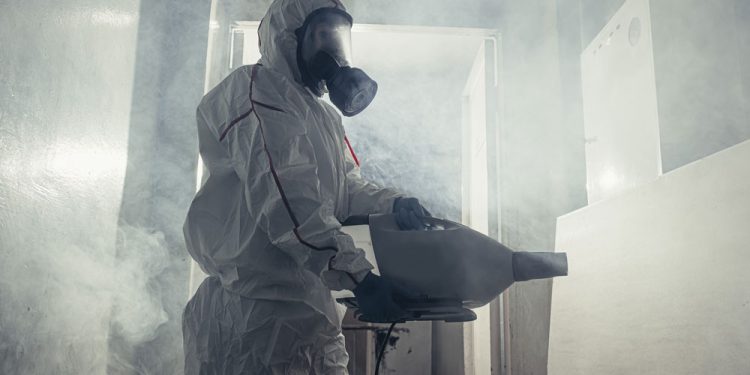Crime scene cleaning, also known as biohazard remediation or trauma scene cleanup, is a specialized and sensitive field that involves the cleaning and sanitization of areas where violent crimes, accidents, suicides, unattended deaths, or other traumatic events have occurred. This process is essential for public health and safety and requires specialized training, equipment, and adherence to strict protocols. Here’s everything you need to know about crime scene cleaning:
Nature of the Job:
Crime scene cleaning involves the removal and disposal of biological and chemical contaminants, including blood, bodily fluids, tissues, and other potentially infectious materials. It also includes cleaning and decontaminating areas affected by tear gas, fingerprint dust, and other chemicals used by law enforcement.
Certification and Training:
Crime scene cleaners typically undergo rigorous training and certification programs to ensure they can safely and effectively handle biohazardous materials. These programs cover safety protocols, cleaning techniques, and the use of personal protective equipment (PPE).
Safety Equipment:
Crime scene cleaners strictly adhere to rigorous PPE protocols to ensure optimal safety in hazardous conditions. This includes wearing full-body disposable suits, gloves, masks, and respirators, which serve as a vital defense against exposure to dangerous microbes and chemicals. With these measures in place, professionals can confidently perform their duties with complete peace of mind.
Cleaning Procedures:
Accomplishing the delicate feat of returning a contaminated locale to its prior level of cleanliness requires specialist knowledge of applicable sanitation methods and the appropriate tools for their implementation. Crime scene cleaners possess this expertise, conducting deep cleans that eliminate both visible and hidden bacteria while deodorizing and applying disinfectants, thus ensuring the conservation of pre-incident conditions. Such competence is essential to effectively managing any hazardous situation.
Legal and Ethical Considerations:
When carrying out crime scene cleaning, companies must observe strict regulatory stipulations related to the disposal of biohazard materials. Moreover, they should act in accordance with moral precepts and treat the deceased and their relatives with due reverence and discretion. It is paramount that stakeholders remain informed about applicable laws as well as professional standards in order to conduct their operations with integrity.
Working Conditions:
Highly trained crime scene cleaners must possess the fortitude to tolerate emotionally taxing and physically strenuous assignments. With unwavering empathy, they address distressing scenarios with a professional approach, ensuring that respect and dignity are retained throughout the entire operation.
Crime Scene Types:
Comprehensive crime scene cleaning is an area of expertise for trained professionals, encompassing much more than the cleanup of homicide scenes. The range of services available can include remediating sites of suicides, accidents, unattended deaths, hoarding cleanups, and meth lab cleanups. To properly address these situations requires a detailed understanding of the biohazardous material that may be present, as well as the experience and skill necessary to ensure safe and complete cleanup.
Insurance:
Families of crime victims can receive a lifeline in the form of homeowners’ insurance policies, which typically cover the cost of crime scene cleanup. This means that individuals need not shoulder the entire financial burden alone a welcome reprieve in an already trying situation.
Specialized Equipment:
Skilled personnel utilize advanced technologies, including ozone machines, foggers, and biohazard waste receptacles, to expertly sanitize and revitalize crime scenes. These industry-standard tools ensure an impeccable outcome, granting peace of mind and upholding the highest standards of environmental safety.
Disposal of Biohazardous Waste:
The safe disposal of biohazardous waste demands the utmost attention to detail. All contaminated materials such as clothing, bedding, and other items must be thoroughly packaged, labeled, and then transported to authorized facilities for responsible disposal. Vigilance is essential in this process to ensure that the surrounding environment remains uncompromised.
Confidentiality:
Rest assured that your privacy is paramount as leading providers of crime scene cleaning services, we ensure complete confidentiality. We guarantee that the grim details and images of the crime scene are never made available to the public or shared with the media. Discretion is a cornerstone of our operation, and we will handle your situation with utmost respect, always.
Regulation and Oversight:
As a well-informed individual, you should be aware of the rigorous standards imposed on crime scene cleaning operations. Vital institutions such as governmental agencies and health departments protect public health and safety by providing oversight and regulation of this specialized field. Their relentless vigilance safeguards the implementation of industry protocols and ensures that all parties involved uphold an unwavering commitment to quality. In short, citizens can rest assured that their well-being is at the forefront of the matter.
To ensure a safe and healthy environment following a tragedy, recognize the importance of entrusting crime scene cleanup San Francisco only to professionals who possess the knowledge, experience, and expertise necessary for such delicate tasks. Strict adherence to safety protocols and a commitment to providing compassionate services go hand-in-hand with their specialized training, making it possible to restore affected areas to their pre-incident condition with complete confidence.





